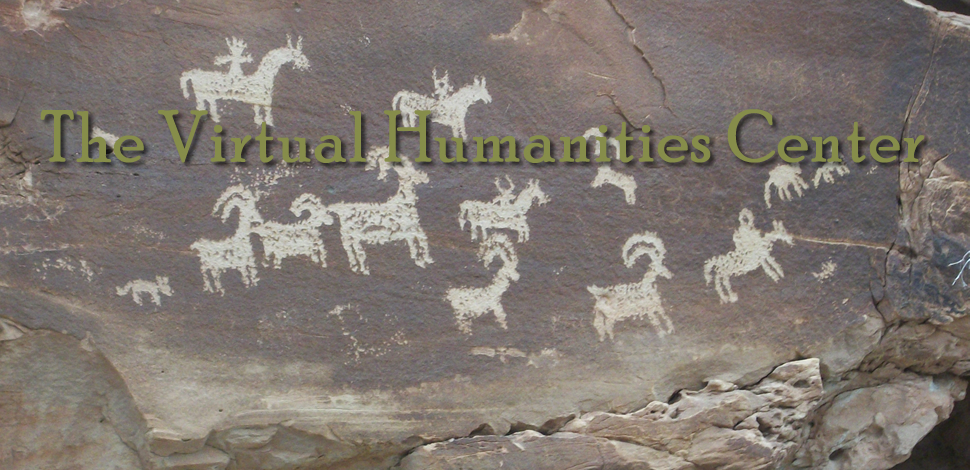
A digital humanities center developed by Great Basin College because 'humanities matter'!
ABOUT THE VIRTUAL HUMANITIES CENTER
The History of the VHC
Faculty at GBC had believed for some time that humanities were not being emphasized enough in our curriculum. We realized that our students are not proficient in many of the important skills that the humanities encourage, such as the ability to think critically about what they are reading or to connect the ideas in that reading to a larger context. As teachers we work with students struggling to use facts to support their opinions—sometimes even to differentiate between fact and opinion—and to present their ideas clearly and cogently. Our students, and students in general, often cannot recognize the validity of other perspectives or value the diversity of viewpoints and ideas that surround them. We searched for ways to help our students gain those core skills and habits of mind that are so important to succeeding in the world of work and building happy and fulfilling lives.
For GBC the solution to this dilemma would have to take into consideration the realities of our situation: a service area that has grown to 87,000 square miles of Nevada, a mission to serve the mostly rural residents of that vast expanse, a strong distance education infrastructure relying on interactive video and online instruction to reach our students. We began with those parameters and a conviction that a renewed focus on the humanities would help our students.
In 2011, a group of faculty began to discuss applying for a grant from the National Endowment for the Humanities. As we talked the Virtual Humanities Center began to take shape: a website that would collect local and regional humanities events, lectures, art, performances that would open our students to the humanities already present in their lives; a site that would assist teachers across the curriculum to include relevant humanities content in their classrooms; a gateway course in the humanities that would help students answer the question, “what does it mean to be human?”; and a way to support live humanities programming at GBC.
Jeannie Rosenthal Bailey gathered those ideas into a challenge grant which was submitted to NEH in 2013. We were expecting a polite refusal, but also valuable suggestions for a later resubmission. To our surprise, in July 2013 we received the news that GBC had received the grant! The GBC Foundation had agreed to support the grant and to go beyond the 2-to-1 match to a 3-to-1 match, meaning that the $500,000 from NEH would realize a total contribution of $2,000,000 to GBC for the project over five years. In July emeritus professor of history and humanities Dr. Cyd McMullen was asked to act as Project Director, with Dr. John Patrick Rice as Co-Director in charge of fundraising and Jeannie Bailey as Grant Manager. A dedicated committee of faculty and administrators began meeting in August 2013 to implement the grant and continues today to oversee and improve its operations.
About the National Endowment of the Humanities
The National Endowment for the Humanities (NEH) is an independent federal agency created in 1965. It is one of the largest funders of humanities programs in the United States.
Because democracy demands wisdom, NEH serves and strengthens our republic by promoting excellence in the humanities and conveying the lessons of history to all Americans. The Endowment accomplishes this mission by awarding grants for top-rated proposals examined by panels of independent, external reviewers.
NEH grants typically go to cultural institutions, such as museums, archives, libraries, colleges, universities, public television, and radio stations, and to individual scholars.
Since 1965, the Endowment has opened new worlds of learning for the American public with noteworthy projects such as:
- Seven thousand books, 16 of which have won Pulitzer Prizes, and 20 of which have received the Bancroft Prize.
- The Civil War, the landmark documentary by Ken Burns viewed by 38 million Americans
- The Library of America editions of novels, essays, and poems celebrating America’s literary heritage
- The United States Newspaper Project, which cataloged and microfilmed 63.3 million pages of historic newspapers, paved the way for the National Digital Newspaper Program and its digital repository, Chronicling America
- Annual support for 56 states and territories to help support some 56,000 lectures, discussions, exhibitions and other programs each year
What are the humanities?
"The term 'humanities' includes, but is not limited to, the study and interpretation of the following: language, both modern and classical; linguistics; literature; history; jurisprudence; philosophy; archaeology; comparative religion; ethics; the history, criticism and theory of the arts; those aspects of social sciences which have humanistic content and employ humanistic methods; and the study and application of the humanities to the human environment with particular attention to reflecting our diverse heritage, traditions, and history and to the relevance of the humanities to the current conditions of national life."
-National Foundation on the Arts and the Humanities Act, 1965, as amended
